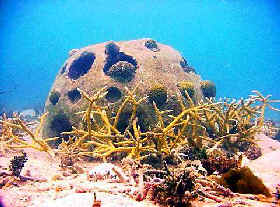
Reef Ball Foundation, Inc.
Southwest Florida Fishing News
August 2000
REEF BALL UPDATE
By Todd Barber, President & CEO, 
Reef Ball Foundation, Inc.
Reef Ball staff will give a demonstration to Classroom on Wheels during the fall
program. Classroom on Wheels is for senior citizens of Sarasota and Bradenton and the
students will learn about Reef Balls in the classroom, then visit the production facility
to see Reef Balls being made.
Negotiations are nearing final stages for between 600 - 1000 Bay, Pallet and Reef Balls to be deployed in Sarasota and Tampa Bay (Sarasota and Manatee Counties) around October 30th of this year by the National Estuary Program.
This project is estimated to increase bio-mass in the bays by 260,000 to 400,000 pounds per year. That's more than a million pounds of fish in the next five years and with an expected life of over 500 years, these reefs could potentially add nearly a billion pounds of fish to the bays (plus lots of other marine life, too!).
"Jim Fowler's Life in the Wild" which will begin airing in September 2000 is researching a story on Reef Balls, possibly in conjunction with the Turks and Caicos summer program of the Reef Ball Coalition.
REEF BALL ROCKS FOR YOUR AQUARIUM
Reef Ball is opening a new division called "Reef Ball Rocks" which will create habitats for aquariums based on our Reef Balls. The
Website is www.reefballrocks.com. You can visit this site and see pictures of Reef Balls with non-living growth for tanks. The following is from the homepage.
From the makers of Reef Ball artificial reefs come Reef Ball Rocks - instant fish habitats with built in bacterial ecosystems for your aquarium! Why wait for your tank to "cycle" when you can add a pre-established Reef Ball Rock containing medication resistant strains of Nitrosoma sp. and anitrobacter sp. bacteria and complete your biological cycling in half the normal time (or even faster).
(Note: Supplied bacteria are not resistant to copper treatments and some antibiotics. To "cycle a tank," the type of bacteria aquarists wish to promote are the nitrifying bacteria "THE GOOD BACTERIA". These bacteria are divided into
nitrosoma sp. which oxidizes ammonia NH20 - and similar compounds to less toxic nitrates - N02 - and the nitrobacter sp, which breaks down the nitrites through oxidation into less toxic nitrates - N03. l he addition of algae or plants helps to
complete the ecosystem by utilizing the N03. )
At the same time, you will be adding - scientifically designed habitats for your fish which increases the carrying capacity of your tank so you can keep more fish and increase the chance for successful breeding - especially beneficial for reef associated or territorial freshwater species such as Chiclids.
What's more, Reef Ball Rocks are designed to help maintain a proper pH balance in your tank because they help guard against low pH. They help to maintain a pH at or above 7.0 but proper pH testing, adjustments and buffering may still be required based on the individual needs of each tank. Reef Ball Rocks can initially raise the pH of freshwater tanks, so caution should be used when introducing for the first time to insure adequate buffering is present to maintain pH and the desired levels.
Reef Ball Rocks are available with textured surfaces or for advanced aquarists they are available with pre-grown (nonliving) barnacles, calcifying tube worms, oysters and other reef building organisms! (Aquacultured only - no natural reefs were destroyed to make these available to you!)
Saltwater Version including Reef Ball Rocks "Live Rock" coming soon!
Large sized Reef Balls are used in the ocean and in freshwater lakes worldwide to restore aquatic eco-systems by the Reef Ball Foundation, a 501(c)3 nonprofit charitable organization. Your use of Reef Balls helps to support these efforts and to signal your respect for our world's aquatic ecosystems. There are other ways to get involved restoring
aquatic ecosystems at www.reefball.org
and www.eternalreefs.org, too.
Visit The Reef Ball website at www.reefball.com
for more interesting facts about Reef Balls.
The Reef Ball Coalition website is at
www.reefballcoalition.org